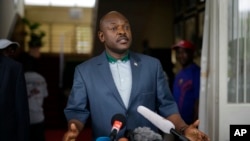The chief executive officer of the Forum for Strengthening the Civil Society (FORSC) in Burundi says President Pierre Nkurunziza should not be part of any unity government.
Vital Nshimirimana's remarks follow violent unrest in Burundi since Mr. Nkurunziza announced he would run for a third term. Critics charge an Nkurunziza third term violates the constitution as well as the Arusha Accord that ended a civil war.
The country's courts ruled he is eligible for a third term because he was chosen by lawmakers, and not popularly elected, for his first term in 2005. The political crisis has forced more than 140,000 to flee to neighboring countries.
Nshimirimana says he welcomes the international community’s rejection of the outcome of the July 21 presidential election, which Mr. Nkurunziza won with 69.41 percent of the 2.8 million total votes cast.
“The government of national unity cannot go with President Nkurunziza as a member. He cannot because once he decided to break the Burundian consensus that put to an end the deadly conflict ... This means that he does not deserve to be at that bench. He has lost his legitimacy to be part of the Burundian stakeholders since he decided to break all what Burundians have built over the years,” said Nshimirimana.
Opposition groups also rejected the polls after boycotting the vote, saying the prevailing conditions were not conducive for free, fair, transparent and inclusive elections.
Some have demanded a fresh poll conducted only after peace is restored and their concerns resolved through dialogue mediated by Ugandan President Yoweri Museveni. He was appointed by the East African Community to help Burundian groups resolve the country’s crisis.
Nshimirimana said the administration has refused to heed to calls by the international community as well as the African Union and the East African Community to ensure there is peace and a resolution of the ongoing crisis before an election is held.
“Civil society released a communique where they stated that there has not been an election as such, since there was unconstitutional and illegal candidate who run alone,” said Nshimirimana.
“The election was held in a kind of an environment where security requirement were not met. There has not been the disarmament of the ruling party militia Imbonerakure [meaning those who see far], which is spreading fear in the country, and the opposition did not campaign to actually participate in the election,” he added.
Supporters of the ruling CNDD-FDD say the presidential election was legitimate, arguing it met constitutional requirements, despite the refusal of the opposition groups to participate in the vote. They maintained the election was credible since other opponents of the president participated in the poll. Nshimirimana disagreed.
“As civil society organizations, we have stated very clearly that the president of Burundi will be respected and be treated as our president up to the date of 26th August this year because he has been elected for his second and last term of office,” said Nshimirimana.
“Beyond that date, he will no longer be our president, he will just be an ordinary citizen and he does not deserve regards from the people. He knows that sovereignty belongs to the people and he cannot pretend to be the president of the people who did not appoint him to represent them.”





